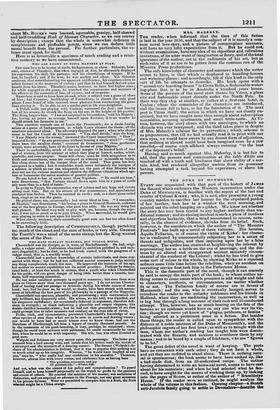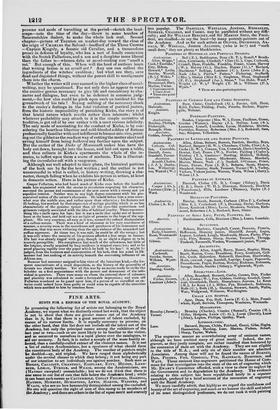THE DUKE OF MONMOUTH.
EVERY one acquainted with that part of the history of JAMES the Second which embraces the Western insurrection under the Duke of MONMOUTH, is familiar with the report of the lust and cruelty of Colonel KIRKE ; who, it is said, after procuring a young country maiden to sacrifice her honour for the stipulated pardon of her brother, took her to a window the next morning, and pointed out the rebel hanging on a gibbet. We know not whether the story has ever been traced to any higher authority than tra- ditional rumour; and its closing incident is such a piece of needless and object!ess barbarity, that a mind accustomed to reason, natu- rally, in the absence of evidence, shrinks from its belief. Such, however, is the anecdote on which the author of "The Munster Festivals" has built up a novel of three volumes. His heroine, Aquila Fullerton, is of course the victim of Kirke': her charac- ter is vindicated by unsuccessfully subjecting her to a series of threats and indignities, and then imposing upon her by a false marriage. The author has strained at heightening the interest by representing her as a bride on the eve of marriage, and the dis- tress by an altered and exaggerated account minutely circum- stantial of the conduct of the Colonel ; whilst he has tried to give some sort of colour to the whole, by showing Kirke as a repulsed seducer some little time before the rebellion, when an accident on recruiting service first took him to the Fullartons' House. This is the domestic part of the novel, though it can scarcely be said to occupy the main part of the book ; to whose author no- thing seems to come amiss which promises to add weight and tale to characters, incidents, or circumstances, no matter whether fit or not. The Fullarton family of course are in favour of Monmouth; and the son, who is eventually hanged, serves to introduce the reader to the unlucky nobleman and his friends in Holland, when they are meditating the insurrection, as well as to lug him through a long account of their rash and ill-conducted attempt. This, however, has as much bearing on the fate of the heroine as an epidemic would have on any one who was its vic- tim; though we never )et knew of "plague, petileuce, or famine" being selected as a prominent actor in a fiction. But besides these things, the reader is called upon to sympathize with the distress of a noble mistress of the Duke of Monmouth's, and the philosophic regrets of her first lover ; as well as to mingle with the men, whom our author's reading has taught him were discon- tented with the Stuarts, and anxious to overthrow them by any means ; and to be bored by a couple of Irishmen, A ho are "figures to be let."
The great defect of the novel is want of keeping. The parts have no connexion with each other ; they do not form a whole, and yet they are unfitted to stand alone. There is nothing natu- ral or spontaneous; • the book seems to have been cooked up, like a bad-made dish, from an ill-understood recipe. The author having determined to write an histotical novel, seems to have cast about for his materials; and when he had selected what he fan- cied, to have sought for the means of working them up, by looking into the pages of Scorr, or rather of the author of " Brambletye House." If the reader were so inclined, he might analyze the whole of the volume in this fashion. Opening chapter—a Scotch anti-Jacobite family going to settle in Devonshire—describe the persons and mode of travelling at the period—sketch the land- scape—note the time of the day—throw in some touches of Somersetshire dialect, to make the whole look real. Second chapter—picture of Taunton on market-day toward the close of the reign of CHARLES the SeCond—landlord pf the Three Crowns —Captain Kingsly, a fanatic old Cavalier, and a tremendous proser in defence of loyalty, who has a sort of family connexion with the Scotch Fullartons, and a son and a daughter more liberal than the father is—whence dabs at novel-reading can "smell a rat." But enough of this. When will the herd of authors learn that writing fiction is an occult art y Any one can collect the ingredients of the witches' cauldron ; but what are they, save dead and disjointed things, without the potent skill to amalgamate them into the charm.
Whether the writer will ever succeed in the higher class of novel- writing, may be questioned. For not only does lie appear to want the creative genius necessary to give life and consistency to cha- racter and dialogue, but even to be deficient in common judg- ment—for how else could he pitch upon such an incident for the groundwork of his tale ? Saying nothing of the necessary shock to the reader's feelings in the total violation of poetical justice, from the historic impossibility of punishing Kirke, the story is of that brutal nature which revolts rather than interests ; whilst whatever probability may attach to it in the simple narrative of tradition, is got rid of by our author with a most curious infelicity. The only mode of accounting for the conduct of Kirke, is by con- sidering the heartless libertine and cold-blooded soldier of fortune professionally familiar with and indifferent to human misries, point- ing out the gibbet as the readiest way of cutting the matter short and saving himself from being bothered any further upon the subject. But the author of the Duke of Monmouth makes him have the body cut down, brought into the house, and laid out upon a table, and then collects in Kirke's apartments the whole of the in- mates, to inflict upon them a scene of madness. This is illustrat- ing the incredulus odi with a vengeance. Although not well adapted to their place, the historical portions of the book are by far the best written ; and the author is not unsuccessful in what is called, in history-writing, drawing a cha- racter, though failing when he exhibits his person in action, at least in dramatic action. Here is his picture of Kirke.
Gaspar Fullerton, who had heard much of Kirke even before the landlord made him acquainted with the stories in circulation respecting his character, surveyed the person and countenance of the new corner with a strong and yet repulsive interest. Neither was in any high degree consonant with his pre- conceived notion of the owner's character. He beheld before him a man some- what over the middle size, and rather spare than otherwise; his features not ill-looking, but marked by that expression of malign placidity which is no less characteristic of the genuine tyrant than all the ogre-like contortions and grimaces vulgarly associated with the idea of habitual cruelty. There was some- thing like a smile upon his lips; but it. was a smile that spoke not of benevo- lence at the heart, and held out not no light of promise to the hope of the sup-. pliant. His very courtesy, all easy as it was, seemed the refined dissimulation of a callous nature. There was a kind of sternness in his very courtliness of manner, a severity even in the smoothness and gentleness of his demeanour and discourse, that was more withering than the open violence of the unmasked and ruffian oppressor. At times too, it was said, he could be all the savage; but it was only where the security of his position afforded a free scope to licence. His hair was already tinged with gray, though in so slight a degree as to be scarcely perceptible. His complexion bad much of the sallowness, but little of the languor, usually acquired by long residence ir tropical tummies; and as he stood glancing rapidly over the paper whii.h he held in his haw', it might hs judged, from the keenness and concentration of his look, that his mind in lili. manner had lost nothing of its activity beneath the enervating influence of an African sun.
Rumour had moreover assigned to him vices of the luxurious kind,—the fre- quent concomitants of a cruel disposition, as the history of the generality of tyrants too clearly testifies. Yet all this was by no means ready to strike the beholder on a first acquaintance with the person and demeanour of the indi- vidual in question. There were many on whom the external show of calmness and placidity was calculated to make a favourable impression; and even old Fullerton wondered us he gazed upon him, if a person of so unruffled an ex- terior could indeed have been guilty or could even be capable of the atrocities which were ascribed to him by common fame.



























 Previous page
Previous page